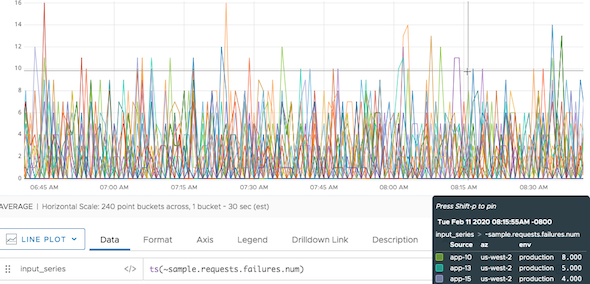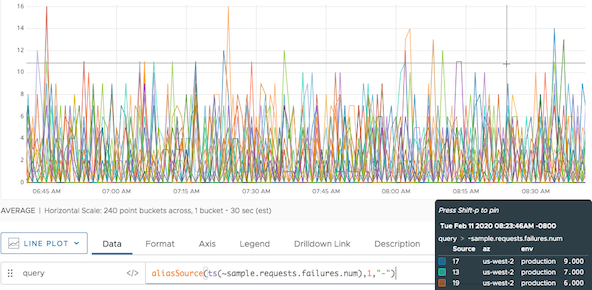Summary
aliasSource(<tsExpression>, "<newSourceName>")
aliasSource(<tsExpression>, [metric|source|{tagk, <pointTagKey>},]
<zeroBasedNodeIndex> [, "<delimiterDefinition>"])
aliasSource(<tsExpression>, [metric|source|{tagk, <pointTagKey>},]
“<regexSearchPattern>”, "<replacementPattern>")
Replaces the source name for each time series with an alias, which can be a specified string or derived from existing metadata.
To replace the metric name with an alias, use aliasMetric().
Parameters
| Parameter | Description |
|---|---|
| tsExpression | Expression that describes the time series to be given new source names. |
| "newSourceName" | Static string value to replace each source name with. If tsExpression describes multiple time series, a new synthetic point tag named _discriminant will be included in the results to separate each original source.
|
| metric|source|{tagk,<pointTagKey>} | Type of metadata value to extract a node or substrings from.
source.
|
| zeroBasedNodeIndex, "delimiterDefinition" | Replace the source name for a time series with a single node that is extracted from the source name, metric name, or point tag value. Nodes are delimited by periods ("."), unless you define a different set of delimiters.
|
| "regexSearchPattern", "replacementPattern" | Construct the new source name for a time series from substrings that are extracted from the source name, metric name, or a point tag value.
|
Description
The aliasSource() metadata function lets you replace the source name of each time series described by tsExpression with an alias. The alias can be a specified string or a string that is derived from the metric name, the source name, an existing point tag value, or a combination of these.
For example, let’s say you have a set of metrics that includes the customer name, for example, cpu.loadavg-customerA.1m, cpu.loadavg-customerB.5m, and so on. All of these metrics are reported by a source named source1.
What if you wanted to aggregate the data and group by customer? You could create two separate ts() expressions, or you could instead use aliasSource() to replace source1 with a name like customerA or customerB. You could then group by source and get the answer you need from a single expression.
aliasSource() lets you replace source names with:
- A simple replacement string.
- A replacement string that contains variables.
- A single node that is extracted from the metric name, the original source name, or a point tag value.
- Substrings that are matched by regular expressions from the metric name, the original source name, or a point tag value.
Simple Replacement String
You can specify a simple replacement string if you want to use the same source name for all time series described by tsExpression.
aliasSource(ts("sample.db.connections.*"), "Source.Test")
Note: Starting with release 2018.22, source names are converted to lowercase to maintain consistent behavior for series matching. When you use aliasSource() with a static string, source names retain the case you specify.
Replacement String With Variables
You can specify a replacement string with variables if you want the new source name for each time series to contain one or more metadata values from that series. You can use any combination of variables and embed them in text. The following variables obtain the metric name, the original source name, or the value of a specified point tag:
"{{metric}}" "{{source}}" "{{<pointTagKey>}}"
Suppose you have a metric that has a region point tag, and you want to display a chart in which the source of each time series consists of the string Price, followed by the value of the region tag and the source name, separated by slashes. The following function accomplishes this:
The specified replacement string acts like a template, in which VMware Aria Operations for Applications (formerly known as Tanzu Observability by Wavefront) replaces each variable with the requested string value. If a time series has a point tag region=us-west-2, that time series is displayed with a source name like Price/us-west-2/mycluster-2c-ha2-i-00e421d1bef7fb88e.
Single Extracted Node
A common practice is to use naming conventions that provide structure to metric names, source names, or point tag values. Naming conventions typically subdivide metadata values into nodes, which are substrings that are delimited by certain characters. By default, Operations for Applications uses periods (“.”) as node delimiters, but your naming conventions might use other characters.
You can use aliasSource() with a zeroBasedNodeIndex to extract a single node from an existing metadata value and use just the extracted node as the metric name for your time series. For example, you might want to simplify a source name like dev.host1_appA.0fd795b1700 by displaying it as host1_appA.
zeroBasedNodeIndex specifies the node to extract by counting nodes from left to right, starting with 0. By default, aliasSource() extracts the node from the original source name. To extract a node from the metric name or a specified point tag value, you must explicitly include metric or tagk, <pointTagKey>.
For example, suppose you use the following naming convention for a source namespace, and you consider periods (“.”) to be node delimiters: <environment>.<hostN>_<appN>.<idNumber>
Under these conventions, the nodes in the source name dev.host1_appA.0fd795b1700 are numbered as follows:
| node | node number |
| dev | 0 |
| host1_appA | 1 |
| 0fd795b1700 | 2 |
The following query extracts host1_appA from the original source name and uses it as the new source name:
aliasSource(ts(disk.space.total.environment), 1)
host1_appA is a single node because it does not contain a period (“.”), which is the default delimiter. You can specify a nondefault set of delimiters to change how names are divided into nodes. For example, if you redefine the delimiter set to include both periods (“.”) and underscores (“_”), then appA becomes node 2. The following query extracts just appA from the existing source name and uses it as the new source name:
aliasSource(ts(disk.space.total.environment), 2, "._")
Matched Substrings
You can use aliasSource() with a regular expression "regexSearchPattern" to match one or more substrings from an existing metadata value, and then construct the new metric name "replacementPattern" from one or more matched substrings. You can combine these substrings with text and variables.
By default, aliasSource() applies the regular expression to the original source name. To apply the regular expression to the metric name or to a specified point tag value, you must explicitly include metric or tagk, <pointTagKey>.
For example, assume your source names follow the pattern db-1, db-2, and so on. The following query renames the source for each time series by combining the numeric part of the original source name with the value of the env point tag and prefixes it with the the string src:
aliasSource(ts(~sample.db.connections.*), "db-([0-9]*)", "src$1-{{env}}")
Examples
The following examples show how to use aliasSource with a zeroBasedNodeIndex.
Extracted Node Example 1 - Renaming source(s) with an existing source name node
Assume that your base expression ts("requests.failures.num") has 40 unique sources sending data. Those 40 unique sources are named app-1, app-2, app-3…app-40.

In this example, you’d like to ignore the app reference in the existing source name, and display only the number as the source name. You can do that with the following expression:
aliasSource(ts("requests.failures.num"),1,"-")

- You don’t need to specify a source parameter because you are extracting a node from an existing source name and the default is source.
- The
"delimiterDefinition"parameter specifies hyphen (-) as a delimiter because this source name uses hyphens (“-“) as delimiters. - The zeroBasedNodeIndex of 1 extracts only the number and drops the string. The pattern is
app-<number>, that is,app = 0and<number> = 1.
Extracted Node Example 2 - Renaming Source(s) with a Metric Name
This example assumes 1 physical server running 8 virtual machines. Each virtual machine is sending stats into Operations for Applications. The source name is the physical server. The unique virtual machine name is only in the metric name:
ts(disk.space.total.vm1)
source=phyServ
To see the virtual machine name instead of the physical server name as the source name, you can use aliasSource:
aliasSource(ts(disk.space.total.*),metric, 3)
- You set the second parameter to
metricbecause you want to extract the string from the metric name. - You don’t have to specify a delimiterDefinition because the metric name uses only periods as delimiters.
- You set
zeroBasedNodeIndexto 3 because the VM name has that index indisk.space.total.vm1.
This approach replaces phyServ with vm1, vm2, vm3, etc. for each unique metric.
Extracted Node Example 3 - Renaming Source(s) with a Point Tag Value
Assume that you have 5 unique servers (server1, server2, server3, etc.) that run multiple applications. A set of general metrics such as application.latency, applies to all applications. You apply an appId point tag to the data format to determine the associated application for each source on a chart. The format of the appId point tag is:
appId=<company>.id-<value>_<appName>
For this use case, you’d like to replace the existing source names (server1, server2, server3, etc.) with the numeric id- value and the application name. You use the following expression:
aliasSource(ts("application.latency"), tagk, appId, 2, ".-")
In the example above:
- You want to extract a new source name from an existing point tag value associated with the
appIdpoint tag key, so you entertagk, appIdas the source option parameter. - You want the new source name to be
<value>_<appName>, so you specify period and hyphen as the"delimiterDefinition". You do not specify underscore (“_”) as a delimiter. If you were to do that, then the zeroBasedNodeIndex approach would no longer extract both the<value>and<appName>from the existing point tag value(s). - You set
zeroBasedNodeIndexto 2. ThedelimiterDefinitionchoices – both hyphen and period – set<company>to 0,idto 1, and<value>_<appName>to 2.
The following set of examples uses the same scenarios as the zeroBasedNodeIndex examples, but uses the regular expression approach.
RegEx Example 1 - Renaming Source(s) with an Existing Source Name
For this example, you replace the zeroBasedNodeIndex in the example above with a regular expression:
aliasSource(ts(requests.failures.num), "app-([0-9]*)", "$1")
"regularExpression"is set to"app-([0-9]*)", so you capture everything after theapp-substring that is a number and put that into capture group 1.- You can then refer to that capture group as
$1in thereplacementPattern.
RegEx Example 2 - Renaming Source(s) with a Metric Name
The syntax for implementing Example 2 using a regular expression is:
aliasSource(ts(disk.space.total.*), metric, "disk.([a-z-0-9]*)..*", "$1")
RegEx Example 3 - Renaming Source(s) with a Point Tag Value
The syntax for implementing Example 3 using a regular expression is:
aliasSource(ts("application.latency"), tagk, application, ".*.id-(.*)", "$1")
RegEx Example 4 - Renaming Source(s) with a Source Name
The following example uses aliasSource() with a regular expression. For this example, using the regular expression is more straightforward.
Assume you have sources that look like this: accounts.<company_name>.<group name><numeric value>
You want to set the source to <company_name>.<group name> (i.e., leave off <numeric value>)
This table shows the current source and desired source names:
| Current Source | Desired Source |
|---|---|
| accounts.foo.bar1 | foo.bar |
| accounts.baz.bar7 | baz.bar |
You can easily do this with aliasSource():
aliasSource(ts(requests.failures.num), "accounts.([a-zA-Z.]*)[0-9]*$", "$1")
Learn More!
- For an in-depth exploration with examples, see Metadata (Label Manipulation) Functions